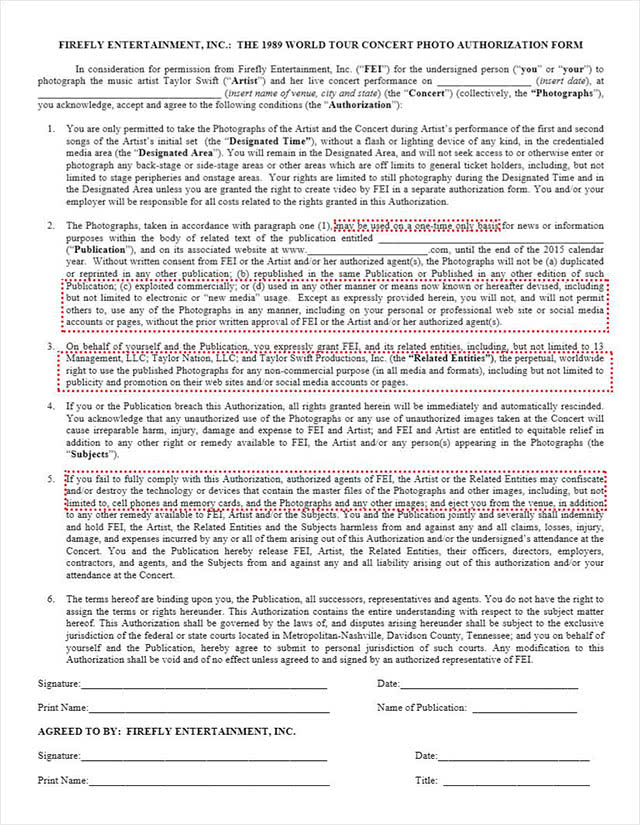As the music industry celebrated Taylor Swift’s victory over Apple Music, following the pop star’s open letter to the company, which convinced them to pay out royalties during their controversial free trial period, one man wasn’t cheering.
As Tone Deaf reported yesterday, concert photographer Jason Sheldon published his own open letter in which he accused the superstar of hypocrisy, saying that while she argues for fair treatment of artists, she herself has not been walking the talk.
Sheldon cited a photo waiver given to photographers shooting the pop singer’s concerts. According to Sheldon, who shared a copy of such a waiver, it stipulates a photographer can use the images from the show only once and only within the published report on that performance.
This means the photographer cannot sell the images to other editorial outlets, nor can they sell prints of the images in any way. As many noted, while photographers do often depend on such secondary sales for extra income, this is not a terribly uncommon limitation.
However, what’s unique about Swift’s contracts is not the rights taken away from photogs, but the rights they grant Swift and her team. Sheldon claims the contract stipulates that Swift and Firefly Entertainment have the ability to use any concert photographer’s images themselves for any publicity or “non-commercial purpose” in perpetuity.
In layman’s terms, this means Taylor Swift and her marketing team, for example, can use a photographer’s work in their own material and campaigns and not pay out a single penny. In some cases, this may even cost the photographer money, as they only get paid if the photos are used by newspapers and magazines.
Well, it turns out things actually get worse. According to UK-based freelance photog Joel Goodman, the contract Sheldon shared was a tad bit outdated. The latest version of the waiver apparently states that photographers who violate the contract can have their gear destroyed on the spot.
As PetaPixel reports, Goodman tweeted a copy of the new contract being handed out to photographers for Swift’s latest 1989 World Tour. “It has been passed to me by two other photographers whom I know, independently of one another, on condition that they remain anonymous,” he told PetaPixel.
“Some photographers fear losing income if they get blacklisted for speaking out against these kind of contracts.” Of particular concern to photographers is Section 5, which states:
“If you fail to fully comply with this Authorization, authorized agents of FEI, the Artist or the Related Entities may confiscate and/or destroy the technology or devices that contain the master files of the Photographs and other images, including, but not limited to, cell phones and memory cards, and the Photographs and any other images.”
What Swift’s management company, Firefly Entertainment, Inc., are saying in this clause is that they reserve the right to destroy a photographer’s personal property, which can often cost thousands of dollars, if they break the terms of the contract.
[include_post id=”451936″]
“This contract is particularly egregious in that it not only contains an all out rights grab on the photographers’ work, whilst limiting their editorial control and ability to earn from that work — and does so without compensation — but because it does so under threat of criminal damage or destruction of property,” Goodman said.
Swift’s team have wasted no time in sorting out what could prove the first splotch on Swift’s otherwise flawless PR record, telling Business Insider that the “standard” contract Sheldon shared has been “misrepresented”.
“It clearly states that any photographer shooting The 1989 World Tour has the opportunity for further use of said photographs with management’s approval,” they add. “Another distinct misrepresentation is the claim that the copyright of the photographs will be with anyone other than the photographer”
“This agreement does not transfer copyright away from the photographer. Every artist has the right to and should protect the use of their name and likeness.”
However, Sheldon has hit back, tweeting, “I never claimed they take our copyright. Just the right to use and give our images away worldwide in perpetuity, just as bad.”





































